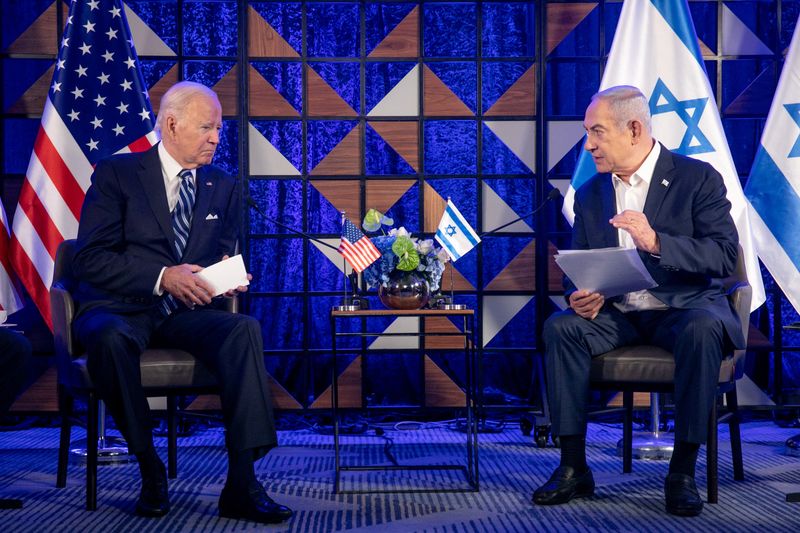By Humeyra Pamuk and Steve Holland
WASHINGTON (Reuters) -When U.S. President Joe Biden publicly aired a Gaza ceasefire proposal developed by Israel and the United States and sent to Hamas, he made the announcement without seeking agreement from Israeli Prime Minister Benjamin Netanyahu, said three U.S. officials with knowledge of the matter.
The decision to announce unilaterally - an unusual step for the United States to take with a close ally - was deliberate, officials say, and narrowed the room for Israel or Hamas to back away from the deal.
"We didn't ask permission to announce the proposal," said a senior U.S. official, who was granted anonymity to speak freely about the negotiations.
"We informed the Israelis we were going to give a speech on the situation in Gaza. We did not go into great detail about what it was."
For months, negotiators from the U.S., Egypt and Qatar have been trying to mediate an end to the conflict that has killed tens of thousands, but a deal has proven elusive.
The proposal announced Friday calls for an initial six-week ceasefire with an Israeli military withdrawal from populated areas of Gaza and the release of some hostages while "a permanent end to hostilities" is negotiated through mediators.
It seeks to build on a deal Hamas accepted earlier this year by keeping a ceasefire in place as negotiations continue, with the aim of reaching a permanent cessation of hostilities, a long-standing Hamas demand.
Biden's announcement and his framing of the proposal as a deal "Israel has offered," was intended to raise hopes for a ceasefire and put pressure on Netanyahu, said Jeremi Suri, a history and public affairs professor at the University of Texas at Austin.
"Biden is trying to box Netanyahu into accepting the proposal," said Suri.
Asked whether the Biden's announcement was an attempt to put pressure on Netanyahu, an Israeli official said that nobody can prevent Israel from destroying Hamas and its governing capabilities.
"The notion that pressure will cause Israel to act in contrast to its national interest is silly," said the official, who spoke on condition of anonymity. "The pressure should be put on Hamas."
Speaking to reporters on Monday, National Security Council spokesman John Kirby (NYSE:KEX) denied that the administration was trying to "jam" the Israeli leader.
OBSTACLES TO A DEAL
It is not clear the latest ceasefire proposal will succeed.
On Tuesday evening, White House National Security Advisor Jake Sullivan told reporters that mediators were still awaiting a Hamas response.
And although Ophir Falk, Netanyahu's foreign policy adviser, said soon after Friday's announcement that Netanyahu had signed off on the proposal, the Israeli leader later made public comments raising doubts that he fully supports it.
On Wednesday, far-right minister Itamar Ben-Gvir said his party would "disrupt" the ruling coalition until Netanyahu discloses details of the prospective Gaza deal.
For his part, Biden faces pressure to end the fighting in Gaza. His Democratic party has been divided over his support for Israel's assault on the enclave, with voters in key battleground states threatening not to support him in November's rematch with Republican candidate Donald Trump.
The war began on Oct. 7 when Hamas-led Palestinian fighters killed more than 1,200 people in Israel, mostly civilians, and seized more than 250 as hostages, according to Israeli tallies.
The Israeli military campaign that followed has left Gaza in ruins and killed more than 36,000 people, according to Palestinian health authorities.
Despite the obstacles, U.S. officials say that by publicly airing the Israeli proposal, Biden can kick-start renewed discussions.
"(Biden) thought it was important to lay out the details publicly so that the whole world can see what was in here and the whole world could see how seriously Israel was taking this, and to make it clear that Hamas absolutely needs to accept this proposal," said one of the officials.

In doing so, Biden employed a tactic he has used previously in his decades as a politician: making a public announcement about a deal in hopes of moving the parties forward, said historian Thomas Alan Schwartz of Vanderbilt University.
"By saying Israel had agreed he was putting Israel in a tough position to say no. In that sense he may have been trying to influence domestic policies in Israel," Schwartz said.